Q&A w/ author, Carl Hart – HIGH PRICE: A Neuroscientist’s Journey of Self-Discovery that Challenges Everything You Know about Drugs and Society
Written on June 18th, 2013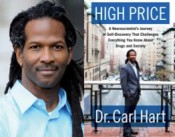 |
Aired: 06/16/13
This week’s guest, neuroscientist CARL HART grew up in one of Miami’s toughest neighborhoods and, in his first book, HIGH PRICE, he explores how it is that he avoided becoming one of the crack addicts he now studies.
Columbia University’s first tenured African American professor in the sciences, Hart goes beyond disputing myths, falsehoods, and ignorance about drugs, drug users, and drug policy. He has been engaged in cutting edge research since the late 90s, testing individuals with actual drugs. His controversial work is redefining our understanding of addiction. He examines the relationships between drugs, pleasure, choice, and motivation, both in the brain and in society. Hart’s findings shed new light on issues of race, poverty, and drugs, and help explain perhaps more clearly than ever why current policies are doomed to fail.
www.highpricethebook.com
Q&A w/ DIRECTOR, ROBERT GREENWALD and TWO WHISTLEBLOWERS
Written on May 28th, 2013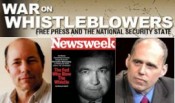 |
Aired: 5/26/13
How difficult is it to be a government whistleblower these days? A dozen years after 9/11, with a former constitutional law professor in the White House, the sad news is that to expose government negligence or illegality is to jeopardize one’s career and life savings.
The newest documentary from producer and director ROBERT GREENWALD and Brave New Films, WAR ON WHISTLEBLOWERS: Free Press and the National Security State highlights the stories of four individuals who felt compelled to reveal acts of government illegality and violations to the U.S. constitution in the military industrial complex in the years following 9/11. In the film, whistleblowers, journalist and experts share what happens when the government punishes those who stand up to demand accountability and defend the constitution. Such actions and the atmosphere they engender has a chilling effect on the speech rights of citizens and the free press. This week I speak about all of this with GREENWALD as well as with two of the courageous whistleblowers featured in the film, THOMAS TAMM and FRANZ GAYL.
www.waronwhistleblowers.com
www.bravenewfilms.com
Q&A w/ DANNY KENNEDY, ROOFTOP REVOLUTION: How Solar Power Can Save Our Economy and the Planet from Dirty Energy
Written on May 13th, 2013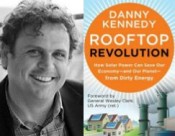 |
Aired: 05/12/13
Is there a revolution coming to your rooftop? While opponents claim solar is expensive, inefficient, and unreliable, in his book ROOFTOP REVOLUTION: How Solar Power Can Save Our Economy And Our Planet From Dirty Energy, DANNY KENNEDY makes clear solar can save money, create jobs, and protect the environment if only politics and perception will get out of the way.
During the recent Presidential campaign, we heard a lot about Solyndra, the solar start-up that received a sizable government loan only to go belly up. Solar’s detractors claim the collapse of Solyndra proves solar is just a hippie pipe dream, but Danny Kennedy, says the truth is quite the opposite. Solyndra failed because it wasn’t able to compete in a red-hot industry, not because solar isn’t ready for prime time.
The industry employs 100,000 people in the United States, twice as many as in 2009 and twice the number of coal miners. In 2011, Warren Buffett invested $2 billion in a solar farm, and General Electric bought a start-up solar manufacturer, announcing, “By 2020 this is going to be at least a $1 billion product line.” Production of solar-generated electricity rose by 45% in the first three quarters of 2010, while electricity from natural gas rose only 1.6% and coal declined by 4.2%. Kennedy argues for a rooftop revolution to break the entrenched power of the coal, oil, nuclear, and natural gas industries and their progress-denying allies.
www.rooftoprevolutionbook.com
www.sungevity.com
Q&A: Dave Zirin, Author- GAME OVER and Sports Editor for The Nation
Written on February 19th, 2013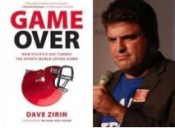 |
AIRED 02/17/13:
This week’s guest is DAVE ZIRIN. Dave is the first sports editor for The Nation magazine. He has for years in books, columns, and commentaries examined both the politics of sports as well as the intersection of the two.
Howard Cosell said “rule number one of the jockocracy” was that sports and politics don’t mix. In his newest book, Game Over, Zirin asserts that modern professional athletes are breaking that rule like never before. From the NFL lockout and the role of soccer in the Arab Spring to the Penn State sexual abuse scandals and Tim Tebow’s on-field genuflections, Dave reveals how our most important debates about class, race, religion, sex, and political power are being played out both on and off the field.
I’ve left my overzealous interest in sports out of the studio for years, but this week — a couple of weeks after the Super Bowl, not long after Lance Armstrong finally admits to doping, and a few hours before the NBA All Star game – I break that barrier. Dave Zirin and I will talk about specific events and athletes, but we’ll also examine the role sports plays in our individual lives and in society.
www.edgeofsports.com
Q&A: Osha Gray Davidson – Germany
Written on January 11th, 2013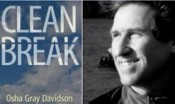 |
Aired 01/06/12
In the year 2000, Germany got 6% of its energy from renewables. That’s about what we get in the US today. But today Germany gets 25% of its electricity from solar, wind and biomass. And Germany is not exactly the American Southwest. Perhaps just as impressive and important, 65% of the country’s renewable power capacity is owned by individuals, cooperatives and communities. Clean and decentralized. I’ll be talking with Osha Gray Davidson about how they did it and what we can learn from their story.
Osha is new to me, but I contacted him immediately as soon as I saw his new book CLEAN BREAK: The Story of Germany’s Energy Transformation and What Americans Can Learn from It. As anyone who listens to this show knows, I feel one of the crucial elements in America’s sluggish response to many of our biggest challenges is our ignorance about what other countries do well.
www.oshadavidson.com
